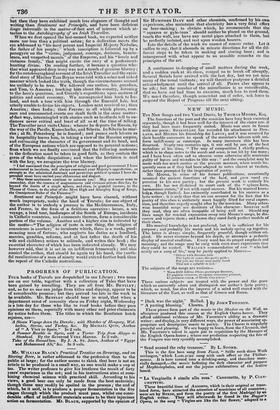NEW MUSIC.
Ten New Songs and two Vocal Duets, by THOMAS MOORE, Esq.
The functions of the poet and the musician have long been exercised separately, though it had been well for the interest of the sister arts if they had been more frequently united. Music was once in favour with our poets; SHAKSrEARE has recorded his attachment to Dow- LAND, and MILTON his friendship for LAWES ; and it was reserved for their humble successors to speak of the musician's labours with uni- form indifference or contempt. In many instances this has been deserved. Nearly two centuries ago, it was said by one of the best melodists of his time, " The way of composition I chiefly profess, which is to shape notes to the words and sense, is not hit by too many; and I have been often sad to observe some otherwise able musicians guilty of lapses and mistakes in this way : " and the complaint may be made with too much justice at the present moment, when words fre- quently seem as if they had been adapted to notes almost at random, rather than prompted by the inspiration of poetry. Mr. Moon, in some of his former publications, occasionally resumed the ancient functions of the bard, and gave vocal ex- pression to his own poetry ; but the present work is entirely his own. He has not disdained to court each of the " sphere.born, harmonious sisters," if not with equal success. But his musical know- ledge, though limited, has eminently contributed to his success as a lyric writer : it is only thus that we can account for the fact that his poetry of this class is uniformly most happily fitted for vocal expres- sion, and therefore eagerly sought after by the musician. Many other- wise beautiful songs are destitute of this character : however well they read, they are often incapable of being well set. Should any lines unapt for musical expression creep into MOORE'S songs, he dis- covers and rejects them ; and hence they stand forth perfect models of their class.
His musical knowledge is not profound, but it is sufficient for his purpose; and probably his metre and his melody spring tip together. The latter is always simple, frequently graceful, though seldom ori- ginal. He never ventures beyond his depth, or attempts a pedantic display of musical erudition. Every word has its proper emphasis and meaning; and the songs may be sung with even more expression than they could be recited. WALLEtt's commendation of one " who had newly set a song of his," may be justly applied to MOORE-
" Others ail!, division hide The light or sense, the poet's pride; Hut you, my friend, may justly boast
That not a syllable is lust."
The subjects of the songs are various-
" Masa detlit ;Wilms Divas, puerusque Deorum, Et pugiletn vietorem, et equum eertamine primum,
Et juseuum cures, et libera sins referre."
These various subjects are treated with the power and the grace which so eminently adorn and distinguish our author's lyric poetry; which, as usual, has also the impress of a mind well stored with the literature of the East, as well as that of Greece and Rome.


























 Previous page
Previous page